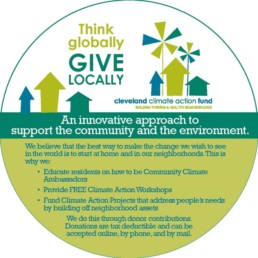Cleveland Neighborhood Climate Action: Engaging Residents with Asset-Based Community Development and Grassroots Grant Making
Year Complete: 2018
Grant Amount: $60,000
Local Government: City of Cleveland, OH
Local Foundation: Cleveland Foundation, The George Gund Foundation
Project Purpose
To establish an equitable model for developing and funding neighborhood projects that aligns climate action with the assets, concerns, and priorities of Cleveland residents.
Key Lessons Learned
Lessons learned about tools and tactics through the project that other sustainability directors could use to advance their work.
- It is crucial to connect climate impacts and action to day-to-day interests and needs of residents and neighborhoods.
- In general, the longer a workshop date is scheduled in advance, the better chance of a large turnout. Don’t underestimate the time it takes to schedule, market and register people. Ensure that the workshop host will be committed once a date is set.
- Identify other local organizations that are doing related work and find ways to cross promote and collaborate with them.
- Connect first with neighborhood leaders with genuine interest in the Fund’s mission who can take ownership over its success.
- Many households do not have ready access the Internet and the need to utilize standard methods for informing people about workshops / grant opportunities (e.g. robo-calling, hard copy newspapers, block club / committee meetings) might be necessary to gain more awareness and attendance.
- During the workshop and when the RFP opens, it was helpful to provide an actual grant example that addresses how a project documents their carbon reduction metric of success.
- Use a platform to allow for the grant application process to be more automated.
- Draft an established grant submission cycle and workshop schedule.
- Understand the challenges of fundraising for climate issues in a blue-collar, conservative state where many of the potential donors are Business-to-Business companies, who may not have as much interest in building community and outreach.
Lessons for developing a collaborative process between a local government sustainability director and local place-based foundation(s).
It is key view the foundations as true partners instead of strictly funders of the project. Like any team, the collaborators need time to get to know each other and identify the priorities for each organization. Face-to-face interaction early-on, and then on a regular basis is helpful for establishing a good working relationship.
Additional Information and Resources
The Cleveland Climate Action Fund continues its work in the area, thanks, in part, to a continued partnership with the Cleveland and Gund foundations. More information on their work can be found here.

